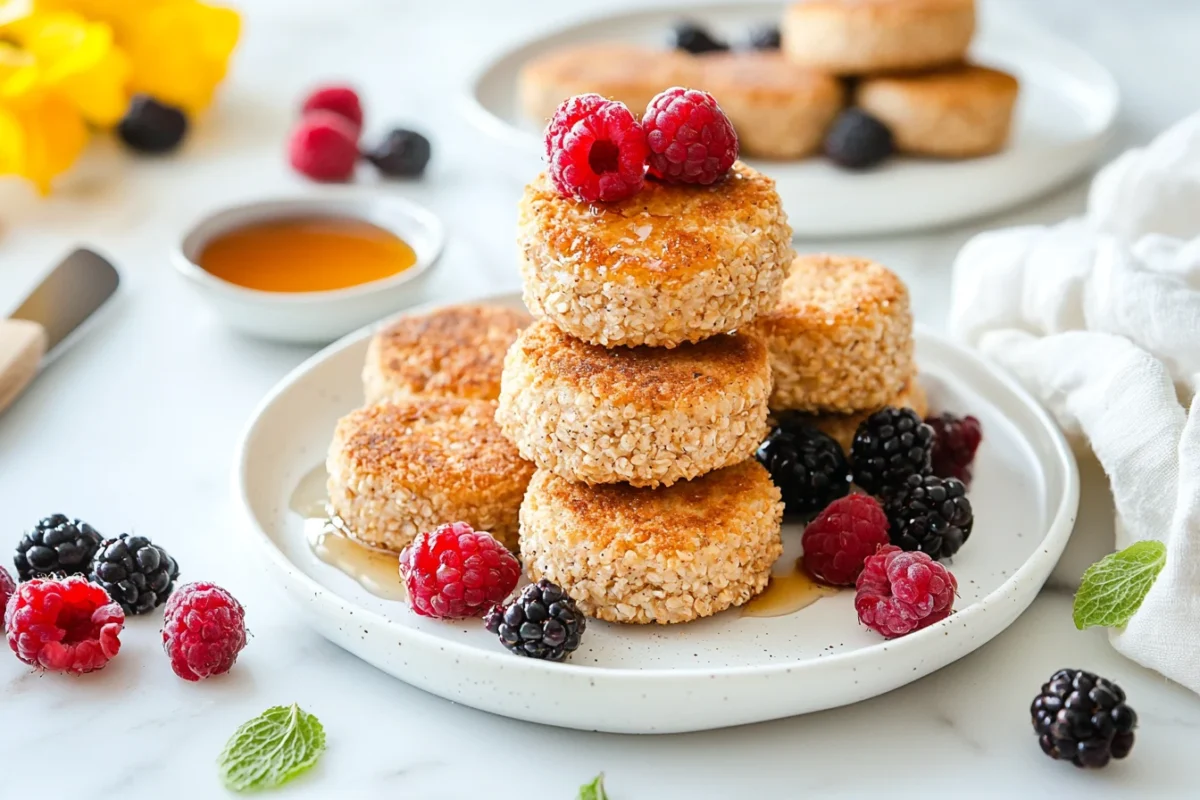Are buckwheat cakes good for you? If you’ve been searching for a delicious yet healthy breakfast option, you’re in for a treat! Many people crave something tasty to start the day, but they also want it to be nutritious and simple. Buckwheat cakes check all the boxes—they’re wholesome, easy to make, and packed with goodness.
First, these cakes are a smart choice for anyone looking to eat well without sacrificing flavor. Buckwheat is naturally gluten-free, rich in nutrients, and full of fiber. It supports digestion and provides a satisfying meal that keeps you feeling full longer. Plus, they’re versatile! You can top them with fruits, nuts, or even a drizzle of honey for extra flavor.
Why wait? Try these delicious cakes and see how easy it is to enjoy healthy eating. Keep reading to learn more about why they’re worth adding to your plate!
Table of Contents
Health Benefits of Buckwheat Cakes
Nutrient-Rich Ingredients for Wellness
Buckwheat cakes are loaded with nutrients that promote overall wellness.
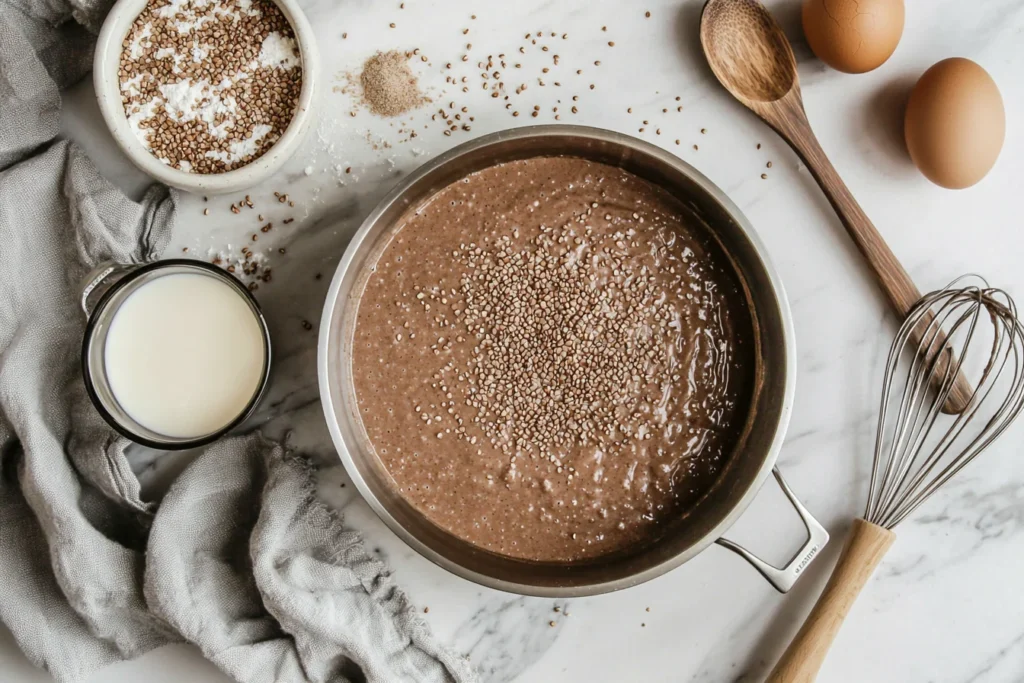
First, buckwheat is rich in essential vitamins like B-complex vitamins, which help with energy and brain function. Then, it contains minerals like magnesium, which supports healthy muscles and bones. The high fiber content in buckwheat keeps digestion smooth and helps you feel full longer, making it a great option for weight management.
In addition, these cakes are naturally gluten-free, making them ideal for those with gluten sensitivities or celiac disease. They’re also packed with antioxidants like rutin, which supports heart health and reduces inflammation. Buckwheat’s nutrient density makes it a superfood in a compact, delicious form. According to the Celiac Disease Foundation, gluten-free foods like buckwheat can be a safe and nutritious choice for those managing gluten-related conditions.
Why not start your day with something wholesome and delicious? Try buckwheat cakes for a satisfying meal that’s as good for your body as it is tasty. You’ll feel energized and ready to tackle the day!
For more details on enhancing recipes with gluten-free options, check out savory buckwheat cakes recipes.
Supporting Digestive and Heart Health
Buckwheat cakes offer amazing benefits for both digestion and heart health. First, their fiber content promotes regular bowel movements, preventing discomfort, bloating, and keeping your gut healthy. Next, the prebiotics in buckwheat support healthy gut bacteria, boosting overall digestive wellness and long-term gut balance.
These cakes are also heart-friendly. They’re rich in magnesium, which helps regulate blood pressure, and antioxidants like rutin, which strengthens blood vessels and improves circulation. In addition, buckwheat’s low glycemic index helps maintain steady blood sugar levels, reducing the risk of heart-related issues, diabetes, and metabolic conditions.
Including buckwheat cakes in your diet can be a delicious way to support both gut and heart health while enjoying a satisfying meal.
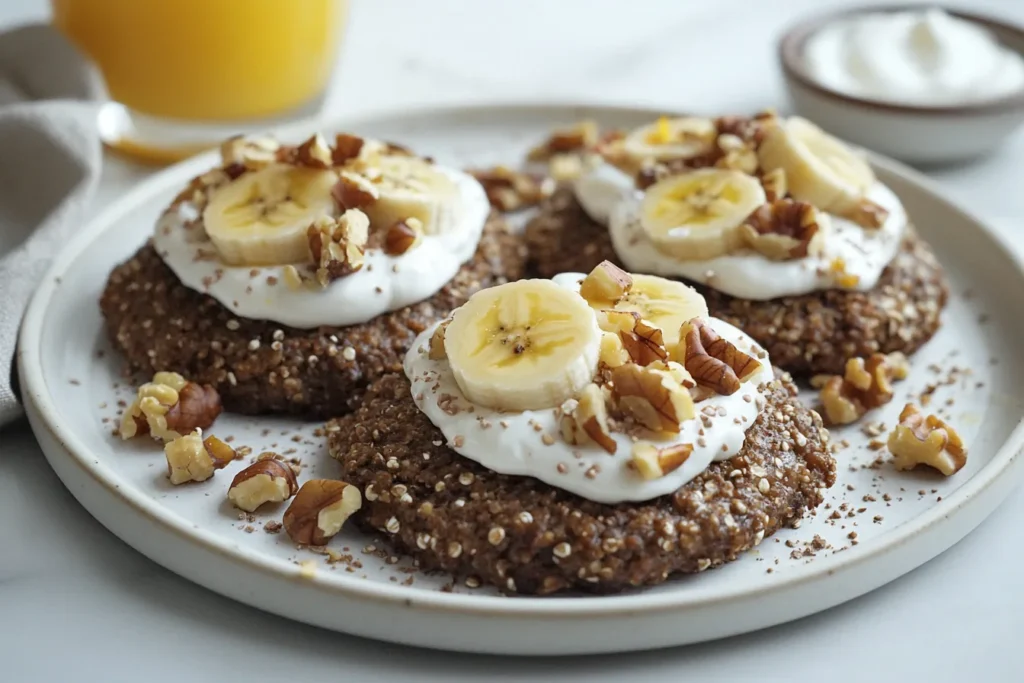
Why settle for less when you can have a dish that tastes great and does so much good for your body? Try them today and enjoy their many benefits!
Why Buckwheat Is a Superfood
Packed with Essential Vitamins and Minerals
Buckwheat is considered a superfood because of its impressive vitamin and mineral profile. First, it’s a great source of magnesium, vital for bone health and muscle function. It also contains potassium, which supports heart health, reduces water retention, and helps regulate blood pressure.
Next, buckwheat provides iron, essential for carrying oxygen in your blood and maintaining energy levels throughout the day. It’s rich in zinc, which boosts your immune system, and B vitamins that improve energy, reduce stress, and support brain health. Additionally, the antioxidants in buckwheat help fight free radicals, reducing inflammation and supporting long-term wellness and vitality.
Why not add these benefits to your diet with buckwheat cakes? They’re a simple, wholesome, and tasty way to enjoy all these nutrients in one meal. Give them a try and feel the difference in your overall health and energy!
Explore how soaking buckwheat flour can enhance its nutritional benefits and improve recipes.
A Great Source of Plant-Based Protein
Buckwheat cakes are an excellent choice for those seeking plant-based protein options. First, buckwheat contains all nine essential amino acids, making it a complete protein source. This is rare among plant-based foods and makes buckwheat a valuable addition to vegetarian or vegan diets.
In addition, the protein in buckwheat helps build and repair muscle, supports metabolism, and keeps you feeling full for longer periods. It’s a great option for post-workout meals, a satisfying breakfast, or even a light lunch. Pair buckwheat cakes with nuts, seeds, yogurt, or even fresh fruit for an extra protein boost and additional flavor.
Why wait? Try buckwheat cakes today and enjoy a protein-packed meal that’s as delicious as it is nutritious. They’re perfect for anyone looking to add healthy, plant-based protein to their diet while keeping things simple, tasty, and fun!
Comparing Buckwheat Cakes to Other Alternatives
How They Stack Up Against Traditional Pancakes
Buckwheat cakes stand out when compared to traditional pancakes. First, they’re naturally gluten-free, making them a safer choice for those with gluten sensitivities. They also have a lower glycemic index, which helps maintain steady energy levels without a sugar crash. Unlike traditional pancakes made with refined flours, buckwheat cakes are nutrient-dense and more satisfying.
In contrast, traditional pancakes often rely on refined flours, added sugars, and minimal fiber, which offer less nutrition and can cause energy dips. Buckwheat cakes provide more fiber, protein, and essential nutrients like magnesium and antioxidants. They’re a healthier, more fulfilling option for breakfast or brunch that doesn’t compromise on taste.
So, why not make the switch to buckwheat cakes today? They’re not only better for your health but also versatile, delicious, and easy to prepare. Try them and see the difference they make in your day!
Gluten-Free and Suitable for Special Diets
Buckwheat cakes are a fantastic choice for those on special diets. First, they’re naturally gluten-free, making them ideal for anyone avoiding gluten due to allergies or celiac disease. They’re also dairy-free and vegan-friendly, depending on how you prepare them, offering incredible flexibility for various lifestyles.
In addition, buckwheat cakes fit well into low-calorie or weight-loss meal plans because they’re nutrient-dense, satisfying, and filling. Their high fiber content keeps you full, making it easier to avoid overeating and maintain healthy portion sizes. Whether you follow a plant-based, gluten-free, or weight-conscious diet, buckwheat cakes are a versatile and delicious option that can fit into any lifestyle.
Why not give them a try today? They’re a simple, flavorful way to enjoy a healthy, satisfying meal that meets your dietary needs. With so many options for preparation and toppings, you’ll never get bored!
Incorporating Buckwheat Cakes into a Balanced Diet
Easy Meal Ideas with Buckwheat Cakes
Adding buckwheat cakes to your meals is a simple way to enjoy balanced nutrition. First, start your day with a hearty breakfast by pairing buckwheat cakes with fresh fruits like berries or bananas. Drizzle them with honey or maple syrup for a naturally sweet touch.
Next, consider using buckwheat cakes as a base for savory meals. Top them with avocado slices, sautéed vegetables, or a poached egg for a wholesome lunch or dinner. You can even turn them into mini sandwiches by layering them with hummus, greens, and roasted chickpeas.
In addition, buckwheat cakes work well for snacks or meal prep. Make a batch ahead of time and enjoy them with nut butter or yogurt during busy days. These ideas make it easy to incorporate healthy and delicious meals into your routine. Try one today and see how versatile buckwheat cakes can be!
Tips for Maintaining Portion Control
Portion control is key to maintaining a balanced diet, even with healthy foods like buckwheat cakes. First, prepare smaller cakes instead of large ones to make portioning easier. This allows you to enjoy a satisfying meal without overeating.
Next, pair your buckwheat cakes with nutrient-rich toppings that add variety without unnecessary calories. For example, fresh fruits, low-fat yogurt, or a handful of nuts make great options. These toppings add flavor while keeping your meal light and balanced.
In addition, pay attention to your hunger levels. Serve yourself a reasonable portion, eat slowly, and stop when you feel satisfied. Planning your meals in advance can also help you avoid overeating. Why not give these tips a try? With just a little effort, you can enjoy buckwheat cakes as part of a healthy, balanced lifestyle without overindulging.
Potential Drawbacks of Buckwheat Cakes
Understanding Buckwheat Sensitivities
While buckwheat cakes offer many health benefits, some people may experience sensitivities to this ingredient. First, it is important to note that buckwheat is naturally gluten-free, but it can still cause allergic reactions in some individuals. Symptoms may include mild itching, stomach discomfort, or, in rare cases, more serious reactions.
Next, cross-contamination can occur if buckwheat flour is processed in facilities that handle wheat. Always check the label for allergen information, especially if you have celiac disease or gluten intolerance. This extra step ensures you avoid unintended health issues.
In addition, if you are new to buckwheat, start with small portions to see how your body reacts. Pay attention to any unusual symptoms and consult a healthcare professional if needed. Understanding these sensitivities helps you enjoy the benefits of buckwheat cakes safely and confidently.
Moderation and Dietary Considerations
Moderation is key when enjoying buckwheat cakes as part of a balanced diet. First, while they are nutrient-rich, they can still contribute to excess calorie intake if eaten in large quantities. To avoid this, pair them with vegetables, lean proteins, or healthy fats for a well-rounded meal.
Next, consider your specific dietary needs when incorporating buckwheat cakes. If you are on a low-carb diet, limit portions as buckwheat contains carbohydrates. Similarly, if you are managing a condition like diabetes, be mindful of portion sizes to maintain stable blood sugar levels.
In addition, keep track of other ingredients used in your recipes, such as sweeteners or high-fat toppings, to ensure they align with your goals. With these tips, you can enjoy buckwheat cakes as a delicious and responsible addition to your diet. Give it a try today and see how easy it can be!
Exploring the Versatility of Buckwheat Cakes
Sweet and Savory Serving Suggestions
Buckwheat cakes are incredibly versatile, offering endless options for both sweet and savory dishes. First, try serving them as a classic breakfast treat by topping them with fresh fruits, a dollop of Greek yogurt, and a drizzle of honey. This combination creates a naturally sweet and satisfying start to your day.
Next, explore savory variations by pairing buckwheat cakes with sautéed vegetables, a sprinkle of cheese, or a soft-boiled egg.
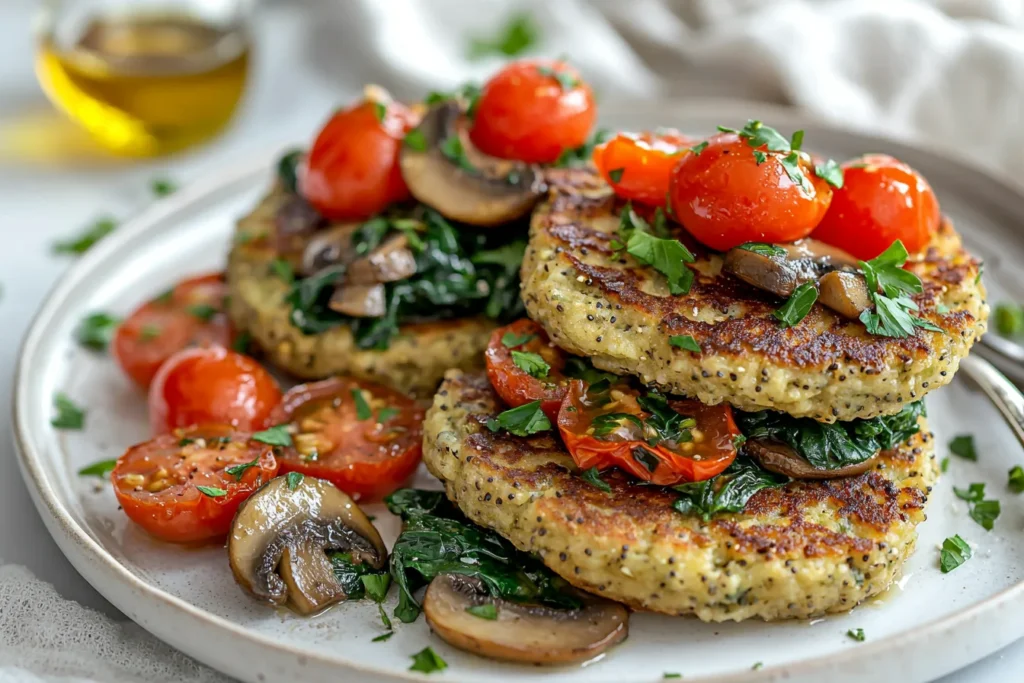
You can also use them as a base for appetizers by layering hummus, avocado slices, or smoked salmon on top.
In addition, they make a wonderful addition to themed meals. For example, serve them with a dollop of sour cream and herbs for a rustic touch. These creative ideas show how buckwheat cakes can fit any occasion. Try one today and discover how they bring flavor and variety to your table.
Creative Ways to Customize Recipes
Customizing buckwheat cakes is a fun way to make them your own and suit any taste preference. First, add ingredients like cinnamon, vanilla, or cocoa powder to your batter for unique flavor twists. These simple additions can transform a basic recipe into something special.
Next, experiment with mix-ins like chopped nuts, shredded coconut, or dried fruits for extra texture and variety. You can also fold in grated vegetables like zucchini or carrots to create a more savory option.
In addition, consider changing the toppings to suit different meals or occasions. Use peanut butter and banana slices for breakfast or opt for pesto and cherry tomatoes for a light dinner. The possibilities are endless, making buckwheat cakes a perfect canvas for creativity. Why not try your favorite twist today and enjoy the endless possibilities of this versatile dish?
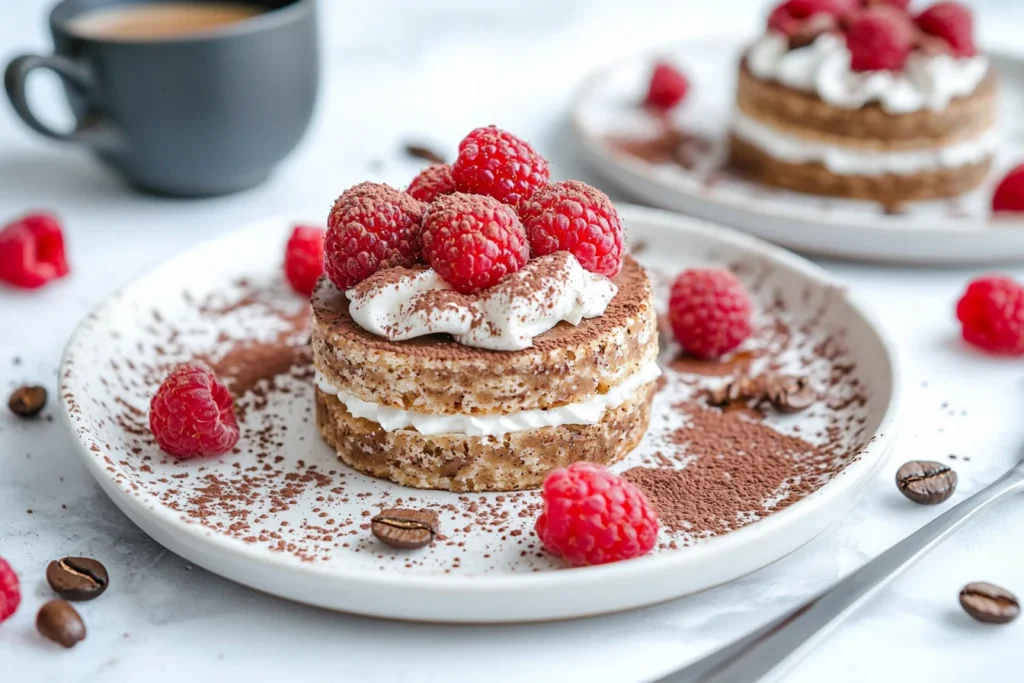
Frequently Asked Questions (FAQs)
Are buckwheat rice cakes healthy?
Buckwheat rice cakes are a healthy snack option with many benefits. They are low in calories and fat, making them great for weight management. They also provide fiber, which supports digestion and helps you feel full longer.
In addition, buckwheat is gluten-free, making these cakes ideal for those with gluten sensitivities. They are rich in essential minerals like magnesium and manganese, which are important for overall health.
These light and crunchy cakes are versatile and pair well with healthy spreads or toppings. Add them to your snack routine today for a nutritious and satisfying option!
What are the benefits of buckwheat pancakes?
Buckwheat pancakes are packed with health benefits that make them a great addition to your meals. First, they are rich in fiber, which promotes healthy digestion and helps you feel full longer.
Next, buckwheat is a good source of plant-based protein, offering essential amino acids that support muscle health and energy. These pancakes are naturally gluten-free, making them suitable for those with gluten sensitivities or celiac disease.
In addition, buckwheat contains antioxidants and minerals like magnesium, which may support heart health and reduce inflammation. Add buckwheat pancakes to your breakfast for a tasty, nutritious start to your day!
Is it OK to eat buckwheat every day?
Yes, eating buckwheat daily can be a healthy choice for most people. First, buckwheat is nutrient-dense, offering essential vitamins like B6 and minerals like magnesium. These nutrients support energy levels, brain function, and overall health.
Next, buckwheat’s high fiber content promotes digestion and helps maintain steady blood sugar levels, making it ideal for daily consumption. It’s also gluten-free and suitable for various diets, including vegan or vegetarian lifestyles.
However, moderation is key, as over-relying on one food can limit dietary variety. Pair buckwheat with other wholesome ingredients for a balanced approach. Should I proceed to the next FAQ?
Is buckwheat a good or bad carb?
Buckwheat is a good carb because it provides complex carbohydrates that digest slowly, keeping you full longer. It has a low glycemic index, which helps regulate blood sugar levels and prevents energy crashes. This makes it a smart choice for maintaining steady energy throughout the day.
Buckwheat is also packed with fiber, supporting healthy digestion and promoting a balanced gut microbiome. Its nutrients, like magnesium and antioxidants, make it a wholesome option. Unlike refined carbs, buckwheat delivers sustained energy without unnecessary sugar spikes. Adding buckwheat to meals is a tasty way to enjoy a healthy, nutrient-rich carbohydrate.
Are Buckwheat Cakes Worth Adding to Your Diet?
Buckwheat cakes are more than just a tasty treat—they’re a smart addition to a balanced diet. First, they’re packed with essential nutrients like fiber and plant-based protein, making them a great choice for staying full and energized. Their versatility also means you can enjoy them in countless ways, whether sweet or savory, depending on your mood.
Next, these cakes are naturally gluten-free, making them an excellent option for people with dietary restrictions. They’re easy to customize with your favorite toppings or mix-ins, so every meal feels exciting and fresh. Plus, they support heart and digestive health, thanks to their nutrient-rich ingredients.
Why not give them a try today? Whether you’re new to buckwheat or a long-time fan, these cakes are a delicious way to nourish your body and explore new flavors. Start experimenting now—you’ll love the results!

